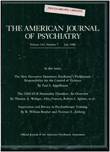Predictors of shorter-, medium-, and longer-term outcome in schizophrenia
Abstract
Predictors of outcome were identified for 163 patients with DSM-III schizophrenia divided into three cohorts by length of follow-up interval: 0-9 years (N = 57), 10-19 years (N = 59), and 20 years or more (N = 47). The most powerful variables predicting outcome differed between follow-up intervals. Characteristics of premorbid functioning were most influential in the first decade of follow-up, family functioning emerged as important in the second decade, and family genetics influenced the third decade and beyond. Signs and symptoms proved predictive in consistent ways for midrange and longer-term outcomes. The results demonstrate significant variability in both the type and strength of relevant predictors depending on follow-up length.
Access content
To read the fulltext, please use one of the options below to sign in or purchase access.- Personal login
- Institutional Login
- Sign in via OpenAthens
- Register for access
-
Please login/register if you wish to pair your device and check access availability.
Not a subscriber?
PsychiatryOnline subscription options offer access to the DSM-5 library, books, journals, CME, and patient resources. This all-in-one virtual library provides psychiatrists and mental health professionals with key resources for diagnosis, treatment, research, and professional development.
Need more help? PsychiatryOnline Customer Service may be reached by emailing [email protected] or by calling 800-368-5777 (in the U.S.) or 703-907-7322 (outside the U.S.).



